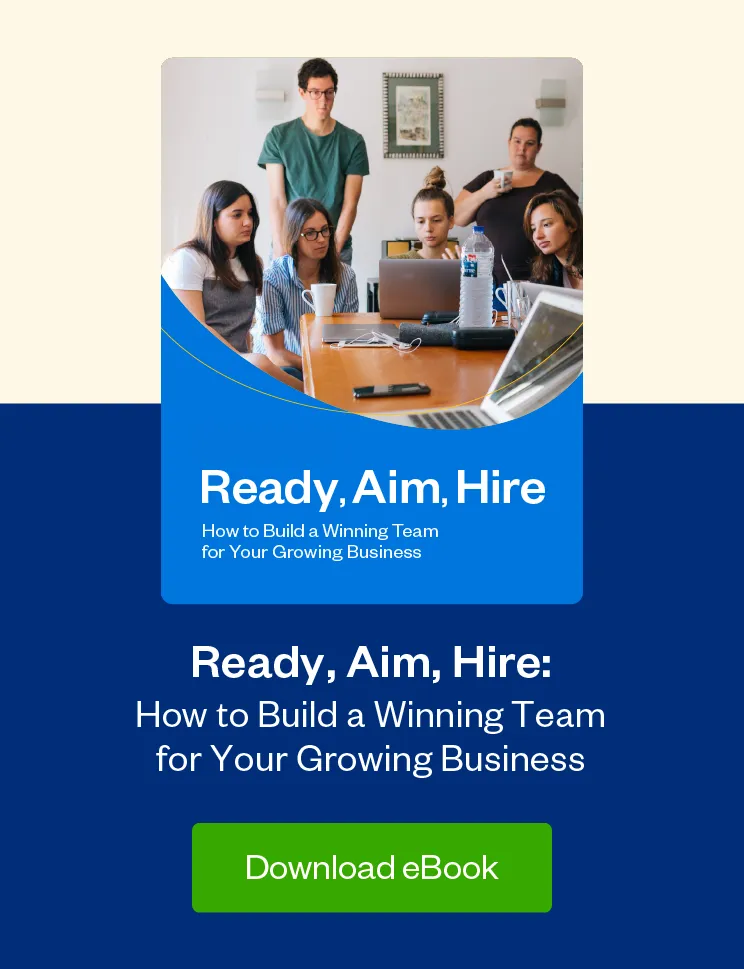Use these smart hiring practices to bring in the best and brightest team members.

One of the key reasons businesses thrive is that they invest in team members who bring the vision of the business leader to life. Having more hands on deck usually means faster, more efficient, and more sustainable growth.
How do you hire the right people for the right roles? It starts with defining your company culture and ends with adopting hiring practices that will help you make the most of the talent you bring on.
Let’s walk through some of the best practices to build effective teams.
Define Your Company Culture
Defining your culture is a little like defining your brand, but focused inward. “Culture” in this sense is a set of stated values and beliefs that drive every aspect of how you and your team members run your business. When you’re clear on your culture, you’re better prepared to know a good fit for your team when you see one.
It’s also important to be aware that each new person on your team may bring their own set of values and beliefs. These differences within your team can enhance your culture and help it evolve.
Different perspectives and healthy friction help to create dynamic teams (and organizations) that thrive on change. Great leaders place importance on this “culture add” (rather than “culture fit”) element when building their team.
Value Diversity
Be open to challenging your own perception of the work you do, the customers you serve, and the very vision and mission you have created. Diverse, equitable, and inclusive teams allow you to do this more powerfully than anything else.
Bring in people who look different, think differently, and even behave differently from you and your existing team members. Many leaders make the mistake of thinking a diverse team is just about appearances. Instead, it’s about adding actual value to your organization and better performance overall.
How Diversity Drives Effective Teams
People who have different lived experiences bring a wealth of information that we wouldn’t otherwise know or understand. They will bring new interpretations of the actions of your customers and perceptions of their pain points, and alternative insights about the work you do.
You can still be an effective leader who is in control of your business; you’ve just hired some allies who will help you understand and accommodate new perspectives.
Look for Team Members Who Want to Grow
While it’s not great for any organization to have a status quo worker, it’s especially disastrous for a small business. When you’re looking to grow your operations, the actions of each person on the team counts. That’s why it’s important to look for people who have aspirations for their own growth on a more personal level.
They may be applying for an administrative assistant job now, but want to take on more responsibilities so they can progress on their career path. This might mean you’re looking for another assistant in a year or two, but there are a lot of big thinkers willing to start at the bottom, especially recent graduates.
A Note on Leadership Style
The best way to retain a motivated employee is to create conditions for them to shine. Once they’ve mastered the duties they’ve been hired for, look for other ways for them to contribute. And make sure they feel acknowledged and empowered to keep striving for more.
When a team member is doing a great job, an effective manager gives positive reinforcement by publicly and privately recognizing their efforts. And, if you value them, be sure their pay is at the top of what you can afford. A high-performing employee can take your business to new heights.
Seek Out Soft Skills
When you’re bringing on a new team member, it’s tempting to be laser-focused on the hard skills required to fill that role. Bookkeepers need to know accounting, graphic designers need design expertise, IT professionals must know computers.
But what about the soft skills that you ideally want all your team members to have? Attributes like critical thinking, the ability to solve problems, communication, and teamwork apply to any role in any organization, and they’re often overlooked.
A graphic designer who is also adept at problem-solving and communication will be able to come up with solutions to unforeseen project snags, and share the news with you at the right time and in the right way. An admin with an aptitude for seeing the big picture and decision-making can anticipate what you need and make the right call, freeing up tons of time for you to focus on your business.
Employees who don’t have those abilities may require a lot of supervision and detailed direction to achieve team goals.
Soft Skills for Building Great Teams
The specific capabilities that can benefit your team may vary. But here are some examples of valuable soft skills to consider as you grow your team:
- Communication
- Leadership
- Motivation
- Confidence
- Decision-making
- Flexibility
- Initiative
- Time management
- Organization
- Innovation
- Accountability
- Teamwork
Assessing a Candidate’s Soft Skills
So how can you identify these more qualitative strengths? Prompts like these, from Monster, are a good place to start:
- Tell a story about a time you solved a problem at work.
- Tell a story about a conflict you had with another team member at work.
- Can you give an example of a time that you disagreed with the direction or priorities of a team leader? How did you respond?
- Tell me about a time when you made a mistake, or a manager asked you to make corrections. How did you handle it?
The feedback you get from open-ended questions like these can quickly distinguish high-performing team players from good-on-paper candidates.
Look Beyond the Resume
When hiring, it’s crucial to focus on more than just a candidate’s resume to assess their qualifications for a role. Some of the most successful people out there didn’t finish college, or have big gaps in their resumes. Taking time to travel or being a stay-at-home parent, for example, are common reasons for a resume gap, and might actually show personal determination that could benefit your team.
Avoid letting the resume tell the whole story of a person’s aptitude. Think about your company and team values, and how employees can contribute. Are you constantly evolving? A candidate who moved around a lot as a kid may have the adaptability you’re seeking.
Someone without direct sales experience in your industry might have something to say about building customer relationships if they volunteer in the fundraising arm of a charity in their spare time. In short, to build a truly great team, be open to experiences from all avenues of life.
Building a Successful Team
Building a successful team requires having a clear vision for your business. But it also requires that you pay close attention to the whole person you are considering for your team rather than simply ticking off a list of requirements. It calls for a willingness to listen, grow, and keep an open mind.
When you surround yourself with team members who bring different strengths, work styles, perspectives, and purposes, your company can become a place where everyone shines.
This post was updated in May 2021.
about the author
Heather Hudson has been a freelance writer for more than 17 years. As a small business owner, she understands the triumphs and challenges of life as an entrepreneur. And as a long-time FreshBooks customer, she’s always looking for ways to work smarter, not harder. You can learn more about her work at heatherhudson.ca.

 Trying to Grow Revenue? Start Investing in Employees
Trying to Grow Revenue? Start Investing in Employees How to Create an Outstanding Workplace Culture
How to Create an Outstanding Workplace Culture How a Diverse Customer Base Protects Your Business
How a Diverse Customer Base Protects Your Business


![Standing Out From the Crowd [Free eBook]](https://www.freshbooks.com/blog/wp-content/uploads/2022/05/Standing-Out-From-the-Crowd_eBook-Blog-Hero-Image-226x150.png)



